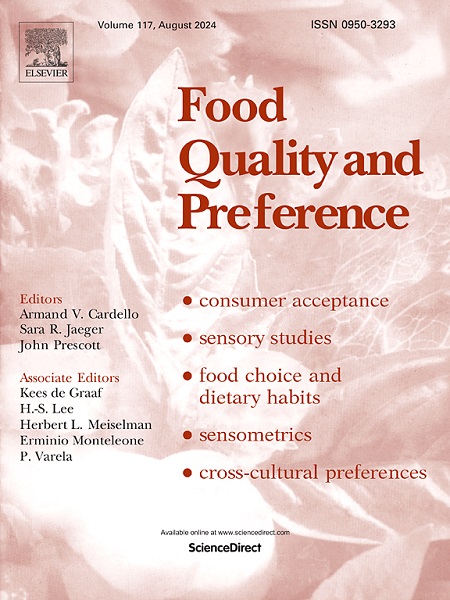Consumers' lay theories on food safety: Insights from a Q-methodology study
IF 4.9
1区 农林科学
Q1 FOOD SCIENCE & TECHNOLOGY
引用次数: 0
Abstract
Consumer perceptions regarding food safety influence their purchasing behavior and consequently public health. Individual perspectives on food safety are diverse and subjective, however, suggesting that a universal behavioral change intervention may not be effective. This study examines fundamental lay theories related to food safety with consumers in Germany. Employing Q-methodology, the study identified and profiled distinct consumer groups based on similarities and differences in the specific lay theories held by group members. Sixty consumers in Germany evaluated a pre-assembled Q-set of 40 statements reflecting a wide range of individual opinions and beliefs regarding food safety, resulting in a quasi-normal distribution. Factor analysis revealed four primary lay theories including defining characteristics: (1) Institutional Trustors: “German regulatory organizations are performing exceptionally well in the realm of food safety”, (2) Label Skeptics: “Labels function as marketing instruments rather than food safety indicators”, (3) EU Pragmatists: “Products manufactured in Europe are considered safe”, and (4) Media Cynics: “Media reports regarding food (un)safety often lack accuracy”. Institutional Trustors emphasize regulatory transparency while dismissing corporate influence; Label Skeptics express distrust towards certifications but support policy reforms; EU Pragmatists appreciate supranational standards while steering clear of alarmism; and Media Cynics exhibit heightened risk perceptions influenced by media while simultaneously and paradoxically trusting inspections despite a broader systemic distrust. The findings strengthen the social amplification of risk and affective heuristic frameworks in the context of institutional and media-induced food system trust erosion. Label standardization, EU-focused transparency campaigns, and media literacy programs are recommended to address specific segments.
消费者的食品安全理论:来自q -方法论研究的见解
消费者对食品安全的看法影响他们的购买行为,从而影响公共健康。然而,个人对食品安全的看法是多样和主观的,这表明普遍的行为改变干预可能并不有效。本研究考察了与德国消费者食品安全相关的基本理论。采用q -方法论,该研究根据群体成员持有的特定外行理论的异同,确定并描绘了不同的消费者群体。德国的60名消费者评估了一个由40个陈述组成的预组装q集,这些陈述反映了广泛的个人对食品安全的看法和信念,结果是准正态分布。因子分析揭示了四种主要的外行理论,包括定义特征:(1)机构托管人:“德国监管机构在食品安全领域表现异常出色”;(2)标签怀疑论者:“标签的功能是营销工具而不是食品安全指标”;(3)欧盟实用主义者:“欧洲制造的产品被认为是安全的”;(4)媒体愤世嫉俗者:“媒体关于食品(非)安全的报道往往缺乏准确性”。机构受托人强调监管透明度,同时忽视企业影响;标签怀疑论者对认证表示不信任,但支持政策改革;欧盟实用主义者欣赏超国家标准,同时避免危言耸听;媒体愤世嫉俗者表现出受媒体影响的高度风险认知,同时,尽管存在更广泛的系统性不信任,但矛盾地信任检查。研究结果加强了制度和媒体引起的粮食系统信任侵蚀背景下风险的社会放大和情感启发式框架。标签标准化、以欧盟为中心的透明度运动和媒体扫盲计划被建议用于解决特定的细分市场。
本文章由计算机程序翻译,如有差异,请以英文原文为准。
求助全文
约1分钟内获得全文
求助全文
来源期刊

Food Quality and Preference
工程技术-食品科技
CiteScore
10.40
自引率
15.10%
发文量
263
审稿时长
38 days
期刊介绍:
Food Quality and Preference is a journal devoted to sensory, consumer and behavioural research in food and non-food products. It publishes original research, critical reviews, and short communications in sensory and consumer science, and sensometrics. In addition, the journal publishes special invited issues on important timely topics and from relevant conferences. These are aimed at bridging the gap between research and application, bringing together authors and readers in consumer and market research, sensory science, sensometrics and sensory evaluation, nutrition and food choice, as well as food research, product development and sensory quality assurance. Submissions to Food Quality and Preference are limited to papers that include some form of human measurement; papers that are limited to physical/chemical measures or the routine application of sensory, consumer or econometric analysis will not be considered unless they specifically make a novel scientific contribution in line with the journal''s coverage as outlined below.
 求助内容:
求助内容: 应助结果提醒方式:
应助结果提醒方式:


